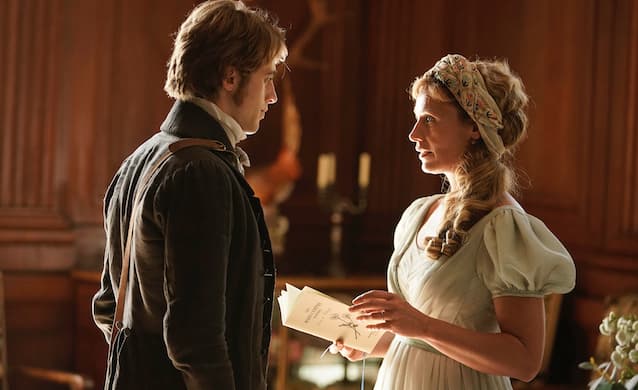‘Lost Illusions’ Is Cinematic Pleasure, Found
Markedly devoid of the dusty mindfulness of the typical period melodrama, the latest from Xavier Giannoli thrives on gratifying our expectations without kowtowing to them.

The latest film from French director Xavier Giannoli, “Lost Illusions,” achieves the seemingly impossible: It captures the richness and multiplicity, the density and hard-won elisions, of literature. Not just any literature, mind you — I mean, we’re not talking comic books here — but that of Honoré de Balzac, an author for whom the compromises of cinema would seem anathema.
Balzac’s defining accomplishment is, after all, a series of accomplishments: the 90 novellas and books that comprise La Comédie humaine, a self-styled chronicle of culture, as well as its many foibles, rendered in a manner sans judgment or condescension.
Which isn’t to say that judgment or condescension don’t figure into Balzac’s world. As “Lost Illusions” makes plain — with its tale of social standing, raw cynicism, ambition, and avarice — both qualities are forever with us. Still, Balzac’s vaunted realism is never lacking in curiosity or empathy: Even the cruelest nature is worthy of understanding.
“Lost Illusions,” the novel, appeared in three parts over the span of six years, between 1837 and 1843. As such, it would seem a natural fit for a limited-run series. Yet Mr. Giannoli took the hard way out, opting to massage an expansive work (the book comes in at about 800 pages) into something considerably more compact. Still, even with a 2-½-hour running time, the esteemed Monsieur Honoré had to undergo nipping and tucking.
Nothing new in that, you might say, and Mr. Giannoli’s decision to focus primarily on the second part of Balzac’s novel, “Un Grand homme de Province à Paris,” seems prudent. But then he also approached the task in a skewed and fairly interesting manner, not wanting to “clumsily plagiarize the story in an academic adaptation.”
Temporarily setting aside his treatment of “Lost Illusions” during its development, Mr. Giannoli listened to music — a lot of music. Vivaldi and Bach, especially, offered a route by which the sweeping intricacies of a multifaceted narrative could be transformed into a coherent piece of movie-making.
How did Mr. Giannoli fare in creating a cinematic corollary for “the great movement of a civilization in full mutation?” Splendidly, and then some. Markedly devoid of the dusty mindfulness of the typical period melodrama, “Lost Illusions” thrives on gratifying our expectations without kowtowing to them.
Because, let’s face it: There isn’t much of anything new about the through-line fueling “Lost Illusions.” Its cautionary tale of a country boy who makes good in the big city and then runs into myriad obstacles was ages old in Balzac’s day. Yet Mr. Giannoli, like Balzac, knows that archetypes can be enlivened and remolded by the peculiarities of the individual. The human animal is, after all, a bottomless resource.
Where to begin? Lucien de Rubempré (Benjamin Voison) lives in Angoulême — which is to say, the provinces — and works in his brother-in-law’s print shop. He has aspirations to be a poet, and has caught the eye of Louise de Bargeton (the statuesque Cécile de France), a lady of standing who is bored with the privilege that comes with having married a wealthy old man.
Louise serves as Lucien’s patron and publishes “Marguerites,” a book of his poems. When Monsieur Bargeton discovers that his wife’s interest in Lucien is more than artistic, Louise’s young lover hightails it to Paris. Literary aspirations, along with saving his backside, are uppermost in mind.
Paris collapses on Lucien like the proverbial ton of bricks. Overstimulation and excitement lead to disaster and disappointment. After having a bad hair day while courting the aristocracy, Lucien ends up working as a waiter. He bumps into Étienne Lousteau (Vincent La Coste), a writer for a local scandal sheet, and is drafted as a contributor, Lousteau having discovered Lucien’s gift for the wicked bon mot. Gone is the lyric poet: Say “hello” to the enfant terrible of the gossip pages.
Lucien’s adventures in the world of print journalism — what with its emphasis on scandal, name-calling, and, yes, fake news — are very funny, and not a little relevant to this morning’s Twitter feed. A newfound passion for the theater allows him to glean additional insights into the limitations of reputation, love, and art. Then there’s the aristocracy and its stilted sense of social propriety.
“Lost Illusions” handles all of the above with a flair that is no less incisive for being generous in spirit and, sometimes, outrageous. Acolytes of French literature will have their say about how true Mr. Giannoli has been to his source material, but in the meantime, here is a rare and resplendent entertainment in which to delectate.

